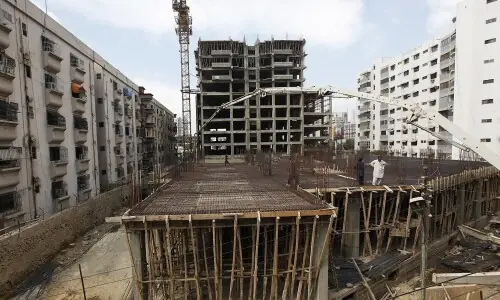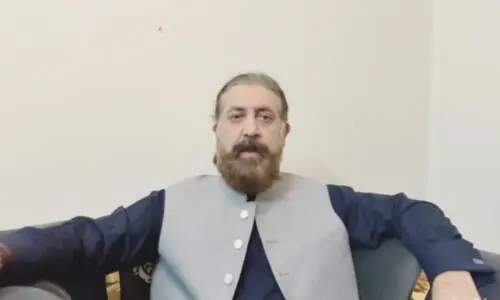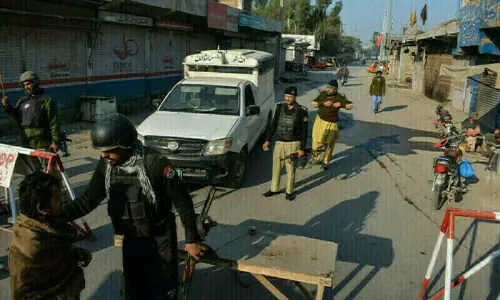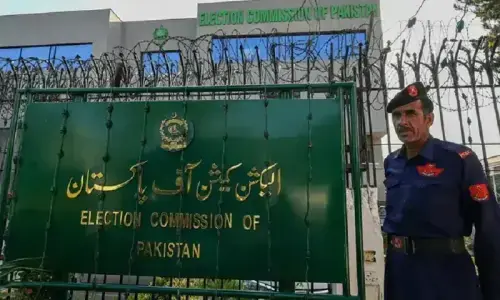ISLAMABAD, Aug 6: Amina Masood Janjua has exhausted physically and psychologically but has not given up search for her husband who was allegedly picked up by intelligence agencies some eight years back.
“I cry at nights but then overcome my emotions with the will to continue struggling until my husband returns home,” said Amina Masood Janjua while speaking at a seminar she arranged to mark her struggle for the safe return of her husband and the 950 missing persons.
Families of the victims of enforced disappearances felt stronger everyday that their loved ones would return home soon, she said.
Organised by the Defence for Human Rights, a trust founded by Amina Janjua on July 30, 2005, the seminar brought together members of the civil society, a few lawyers, and political figures at the Press Club auditorium where large posters of missing persons were put up to remind why they had all gathered.
Although some 600 persons, suspected to have terror links in the war on terror during General Pervez Musharraf’s reign had been released, some 950 were still missing and believed to be in jails or secret detention centres in Pakistan.
Mohammad Bin Masood, one of her sons, was the first to speak. He introduced Masood Janjua as a loving head of the family and a hard working entrepreneur.
Mohammad Bin Masood explained to the audience how he and his siblings had spent their youth in agony and longing for their father to return home safely.
High Court lawyer, Babar Sattar, explained where it all went wrong.
“There is confusion at the conceptual level as well as institutional level about how to deal with the criminal justice system. The state cannot wage war against its own citizens. The problem arose when internal security was handed over to the army, which is not trained to handle the subject,” said Babar Sattar adding how intelligence gathering agencies should not have taken the role of investigation agencies.
He believed that in civilized societies, state could not permit an organisation to play role of judge, jury and executioner.
“There is a legal process that must be followed. Even if the state is 200 per cent certain about a person’s guilt, the individual must be presented before a judge within 24 hours, as clearly stated in the Constitution of Pakistan,” said Babar Sattar explaining how hatred against the army had increased because of violation of law of the land.
Army officer turned lawyer Col Inamur Rahiem, who had been fighting for the rights of the missing persons, said the missing persons had been tried in secret jails and sentenced.
He gave the example of 12 persons sentenced to death by military courts, who did not even know their guilt.
“Dozens more army officers and civilians are in different jails in Pakistan. Islamuddin Siddiqui was picked up in Peshawar, tried in Kharian, his appeal was heard in a fake court in Sargodha and hanged in Multan jail after being missing for three years. His family was told that Islamuddin Siddiqui was performing Air Force duties away from the homeland. But his father was informed about his whereabouts and allowed to see Islamuddin Siddiqui a day before he was executed,” said Col Inamur Rahiem who had been a victim of State oppression for his support to the families of the missing persons.Nasreen Jan, who last saw her brother two years, six months and 16 days ago said, “Why does the government not understand that we are fighting for our loved ones.”
Her brother, M Zameer used to do paint jobs and sanitary fixtures in homes and had gone missing from Rawalpindi.
Human rights activist, Tahira Abdullah demanded that the government must sign the International Convention for the Protection of All Persons from Enforced Disappearance if any progress was to be made on the issue.
Amina Janjua said she believed her husband was still alive. “There have been a lot of clues. A missing person, who came home in 2010, said my husband is in Humza Camp. Then in 2011, a friend from the military circles also confirmed that my husband Masood Janjua is alive and in the custody of the Pakistan army,” said Amina Janjua adding that she and the 1, 400 family members did not demand that they be released but tried properly under the law.
“We have the right to know if they are still alive,” said Amina Janjua.

































